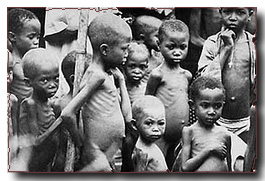The Root Causes of Hunger
- SAMUEL GREGG
The Vatican is reviewing the issue of genetically modified foods, a process that is expected to result in a qualified endorsement. In light of this development, Actons Research Director Sam Gregg examines the ethics of GMF and its promise of reducing hunger in the world.
 |
Perhaps one of the worst visual images of poverty today is the picture of human hunger. Nothing quite distresses us more than the thought of a child in Latin America, Africa, or Asia suffering from malnutrition their very life-essence literally draining away into death, despair, and nothingness.
This is only one of the reasons the promise of Genetically-Modified Food (GMF) has gripped so many people's imagination. The possibility of producing crops genetically-enabled to resist drought, to grow in less-fertile areas, or to produce twice what they wouldotherwise yield seems to be the miracle for which many have yearned.
Concern for the poor and hungry is a non-negotiable principle of Christian faith. It is not surprising, therefore, that the Vatican is currently producing a document on GMF. There are many indications that the document will contain a qualified endorsement of such processes.
The President of the Curial department charged with producing the text, Archbishop Renato Martino, has stated that he personally has no objections to GMF. He has been quoted as stating that "the problem of hunger involves the conscience of every man. For this reason the Catholic Church follows with special interest and solicitude every development in science to help the solution of a plight that afflicts humanity."
In expressing these views, one suspects that Archbishop Martino is aware that the moral case for GMF is strong. From the standpoint of Christian ethics, the created world exists to be used, in accrdance with the natural law, by humans. For this reason, the Church has never regarded as morally problematic the centuries-old practice of genetically manipulating plants and animals through methods such as cross-pollination, not to mention animal cross-breeding. No doubt, Vatican officials are also conscious that there is no existing scientific evidence that GMF is likely to harm humans, animals, or plants.
The first criteria of Christian ethics, "avoid evil", thus appears not to be violated by GMF production. Moreover, if GMF is used to feed those suffering from hunger, then its potential to "do good" (another guiding principle of Christian ethics) is great.
There are, of course, some Catholics who oppose GMF. They do so on prudential grounds, largely with regard to concerns (few of which appear scientifically-based) about GMF's potential effects upon the food chain. What, however, appears to be lost amidst the GMF discussion within theCatholic Church is deeper reflection upon the sources of hunger.
With or without GMF, there is no reason people should be hungry. For famine is not primarily caused by natural elements such as drought. Hunger primarily results from an absence of property rights, rule of law, and free trade. If there are no property rights, farmers have no incentive to grow crops. Without rule of law, they have no guarantee that their produce will not be stolen from them by corrupt officials. In the absence of free trade, agricultural producers in developing nations have little chance of competing with their subsidized, protected American and European counterparts. In other words, the root causes of hunger are to be found in human-made policies.
Consider the following facts. Over the past 10 years, 2 million North Koreans have died of hunger because of the Communist regime's collectivist policies. In the 1930s, 8 million Ukrainians starved to death during the Great Famne engineered by Stalin's destruction of privately-owned farms. Those masses who died in Ethiopia in the 1980s were the victims of war and another Marxist-Leninist regime's socialist economic policies. At this very moment, thousands in Zimbabwe are facing starvation as a result of the Mugabe's dictatorship's systematic destruction of white farmers' property rights, its awarding of stolen property to the dictator's cronies, the disappearance of rule of law, and the consequent collapse of effective and efficient farming.
Hunger is a scourge upon humanity and a defacement of what the Church teaches to be the human person's intrinsic dignity. GMF production that conforms to Christian ethics and the natural law may well be part of the solution. But let us hope that the Church does not lose sight of hunger's deeper causes. Human lives may literally depend on it.
 This is Meaghen Gonzalez, Editor of CERC. I hope you appreciated this piece. We curate these articles especially for believers like you.
This is Meaghen Gonzalez, Editor of CERC. I hope you appreciated this piece. We curate these articles especially for believers like you.
Please show your appreciation by making a $3 donation. CERC is entirely reader supported.

Acknowledgement
Samuel Gregg. "The Root Causes of Hunger." TCS (October 6, 2003).
This article reprinted with permission from Tech Central Station.
The Author

 Samuel Gregg is Research Director at the Acton Institute and a Fellow of the Center for the Study of Law and Religion at Emory University. He is the author of Reason, Faith, and the Struggle for Western Civilization, For God and Profit: How Banking and Finance Can Serve the Common Good, Economic Thinking for the Theologically Minded, On Ordered Liberty: A Treatise on the Free Society, and his prize-winning The Commercial Society.
Samuel Gregg is Research Director at the Acton Institute and a Fellow of the Center for the Study of Law and Religion at Emory University. He is the author of Reason, Faith, and the Struggle for Western Civilization, For God and Profit: How Banking and Finance Can Serve the Common Good, Economic Thinking for the Theologically Minded, On Ordered Liberty: A Treatise on the Free Society, and his prize-winning The Commercial Society.




